'Turn Gaza into a parking lot'
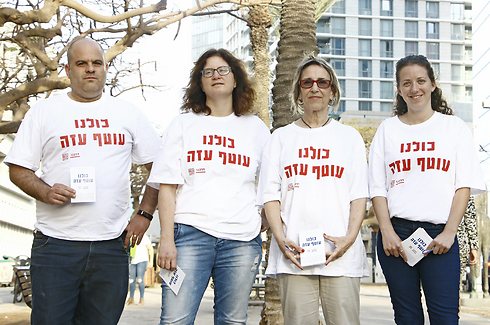
The volunteers from the Gaza border communities getting their message out. Photo by Dana Kopel
Israelis living near the Gaza border have had enough with the constant – and seemingly inevitable – rounds of violence. They went out on the streets of Tel Aviv to find supporters for their demand from the government: Find a solution both military and diplomatic in nature.
By Feige Stern, Eti Abramov, Ynet news
February 27, 2016
Upon hearing an unexpected knock on the door, the family members look at each other, trying to remember if they invited someone over. They wait – perhaps it’s a mistake – but then more knocking is heard, and they get up to open the door. “Good evening, you may not feel this, but war is on the way.” Undoubtedly a strong opening statement. And now what?
While most of the country enjoys relative quiet – sometimes disrupted by stabbing attacks – the residents of the Gaza border communities have been living in a state of war for years now. Even when rockets and mortar shells are not raining down on them, they know it’s only a matter of time before violence resumes: The IDF’s abysmal assessments, knowing that several dozens of terrorists are digging their way to their homes, the odd rocket. They’ve had enough.
Before another round of fighting can begin, they’ve decided to try and explain their reality to those living further away from the frontline. Their goal is to recruit support for some sort of action, whatever it may be, by the government. They plan to do that by going door-to-door in order to bring the winds of war to every home, as well as setting out to main spots around the country to collect signatures on a petition in support of a diplomatic move, done alongside military operations against terror organizations.
We’ve recently joined them at their stalls across the country and during their door-to-door campaign in Givatayim and Tel Aviv.
On the surface, convincing people was not hard: Not even a single person was found, on the left or right, who thought the Israeli government was doing anything to stop Hamas from gaining more power, or to prevent the next round of fighting. The problem is that even in the heart of Tel Aviv, most of the people they encountered supported violent solutions to the situation. Activists from The Movement for the Future of the Western Negev and Darkenu (formerly known as V15) do not support violent solutions, which led to many arguments discussions that led them to despair.
Kill or be killed
Adele Ramer, an English teacher from Kibbutz Nirim, has experienced several difficult situations in her life. As a resident of the western Negev, she and her family have been suffering for years now from rocket fire coming from above, and can feel the tunnels being dug below – and yet they remain optimistic. But when she was standing on Rothschild Boulevard in Tel Aviv this week, she felt embarrassed.
“Do I bother you?” she asks two men having a conversation.
“My only problem with you is that you live in an area that’s part of the State of Israel, and you can’t be so left wing,” one of them answers.
Adele raises an eyebrow. “Perhaps I should move to Ashkelon? But rockets fall there as well. Perhaps I’ll move to Ashdod. Ah, but there as well…”
“No, no, no, under no circumstance should you move,” the man, embarrassed, says. “I just have a problem with people complaining about the situation but voting Meretz.”
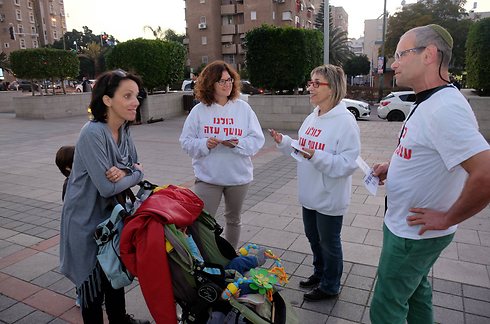
Photo by Yariv Katz
“So far, the right wing hasn’t provided us with solutions,” Adele responds. “We’re here to ask the government to at least present us with a solution, do something! Besides, do you think the country is divided into right wingers who don’t want rockets to fall on them and Meretz voters who do want rockets to fall on them?”
“We need to reach an agreement with the Egyptians, and make all the Palestinians leave through…”
“Does this seem practicable to you? Logical? Ethical? Causing 2.5 million people to leave their homes?”
“Yes.”
The conversation is at a dead end. Both sides agree to disagree, shake hands, and say goodbye.
“I moved to the Negev because of the situation, to show solidarity. But this is also about the quality of life,” another man Adele stops on the street tells her with enthusiasm.
“If you’re like us living in the western Negev, then you know the next war is coming. What can we do?”
“Hit them hard. Once and for all.”
“We’ve done it already. We do it every year. Does it work?”
“No, not really. But maybe this time we can uproot (terrorism).”
“But that’s what they say every time!” Adele says in anger, raising her voice for the first time.
“Look, I’m on your side. Whatever you decide, I’m in favour. The government, excuse my language, is impotent.”
Despite the disagreements, he signs the petition, perhaps only in an effort to politely end the conversation.
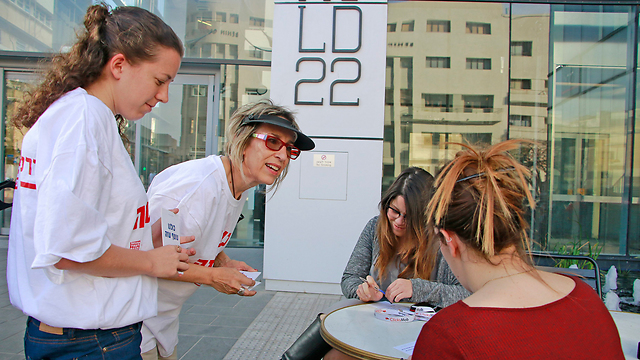
Photo by Dana Kopel
The volunteers seem confused. This isn’t the reception they expected at the bastion of the white left-wing. Instead of bouquets and conversations about the end of the occupation, they’re being confronted over creative ways to turn Gaza into a parking lot.
We turn from Rothschild Boulevard to Allenby Street. Right on the corner, Adele sees a dusty clocks store, one that still sells walkmans and video tapes. She decides to go inside. The store owner is busy reading through a large pile of newspapers. There must not be such a large demand for alarm clocks and video tapes these days.
“We need to destroy their television, their broadcasting stations, their propaganda. If there’s no media, there’s no way to get information across, and then there’s no incitement. And the electricity, too. Take down everything,” he says.
“But then everything will blow up in our face,” Adele tries to argue. “Two million people will simply head for the border fence. What are you going to do, kill them all?”
“Well, and what do you think they do in Syria these days?”
“Do you really want us to be like Syria?”
“If you don’t get them, they’ll get you. Do you want to die?”
“I believe most people living in Gaza want what I want – to live.”
“They don’t. They want you to die. What year did you come to Israel? I’ve been here since 1943, and they’ve always wanted to throw us out to sea. You have to understand their mentality. They need someone to control them. That’s it. There’re no solutions. Kill or be killed.”
Between anemones and Qassam rockets
Adele and her fellow volunteers knock on the door of an apartment building in Givatayim. “Who’s there?” a voice on the other side of the door asks. Adele responds. Quiet on the other end. The woman on the other side of the door, Rina Ram, is wary of opening the door to strangers. Eventually, she gets up and opens the door only a little bit, trying to understand what exactly do the three people standing outside in white shirts that say “We’re all with the Gaza border communities” – one of them even wearing sandals in the middle of winter – want from her.
“Hello,” Adele says. “We’re from the Gaza border communities, and we’ve come to ask for your support.” After the exchange of a few more pleasantries and a short ideological discussion, not only did Rina sign the petition, but also insisted on bringing them something cold to drink, and later even relented and agreed to have her photo taken with their sticker, promising to put it on her car.
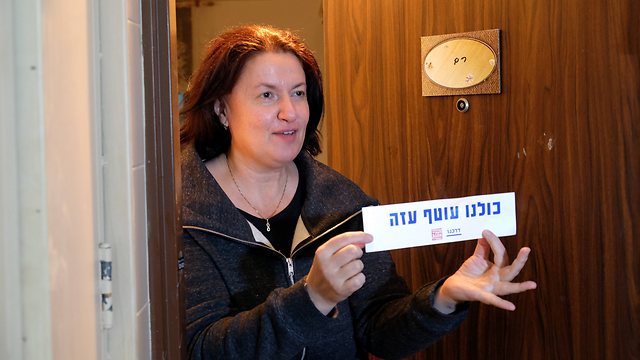
Rina Ram, photo by Yariv Katz
“What I think will happen is that the tunnels will reach all the way here,” Rina says. “The solution, in the coming decade, is a security solution. We need to exercise a firm hand with them, the carrot and stick method.”
“So according to what you’re saying,” one of the other volunteers, Gali, jumps in, “I am guaranteed to become a refugee in my own country every two years and move from one friend’s home to another.”
Rina: “It’s delusional to think that if you throw money at the problem, it’ll pass.”
In hindsight, Rina turned out to be a relatively hard nut to crack in Givatayim. The rest may not have felt like war was just around the corner, but they at least tried to express solidarity with the volunteers.
One floor up, Michal Haim opens her door to the volunteers. “I keep hearing on the radio that (Gaza border residents) can hear the digging (of tunnels), and my heart goes out to them,” she explains. “It’s very frustrating that they live inside Israel, but we still need to be worried about them.”
“My daughter is 32 years old and still afraid to leave the house,” Adele responds emotionally.
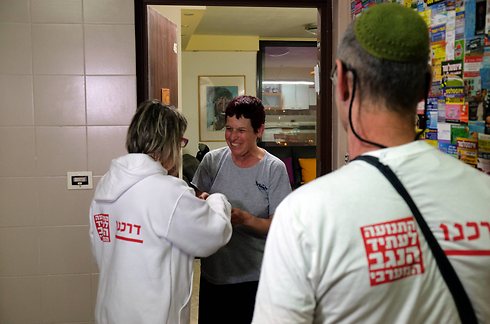
Photo by Yariv Katz
Later, she talks about meeting many people who were evacuated from Gush Katif (area of Jewish settlement in the Gaza Strip evacuated in 2005 – ed.) during the “Red South Festival.” She asks them to sign the petition as well. “The only ones I’m having a hard time with are those among the evacuated who tell me I deserve every rocket I endure,” she says.
At every opportunity, whether it’s canvassing door-to-door, during “Red South Festival” events, and at the movement’s stalls at the Friday market in Sderot, the volunteers ask for support to their demand for another solution – one that combines military action with a diplomatic arrangement, with Hamas. They recruit to their cause top IDF officers, and even politicians like Naftali Bennett, who recently surprised many when he said he was more or less in favour of the “reconstruction in return for quiet” formula.
In addition to Adele – the teacher, medical clown and masseuse – there are also David Drori, the dairy farmer from Kibbutz Sa’ad, and Gali Basodo from Sderot, who is part of the governing council of the Movement for the Future of the Western Negev.
When I try to understand the difference between the Gaza border area and the western Negev, she tells me frankly, “The western Negev is anemone flowers, the Gaza border area is Qassam rockets. Our goal is to get everyone to join us in demanding the prime minister to present a clear plan. To look us in the eye and tell us what his plans are for our future.”
She turns to Ariel, a guy from Givatayim whose ex-girlfriend is from Kissufim. Ariel doesn’t shrink back. He stops his bike, and like every other Israeli, he obviously has his own ideas. “I have a solution!” he declares.
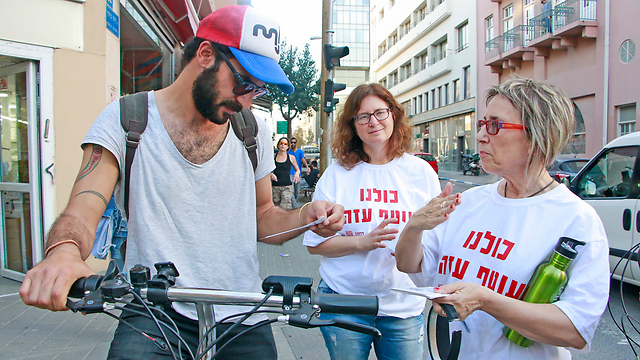
Photo by Dana Kopel
“Well?” the three dreamers from the Gaza border area ask.
“But it’s not practical.”
“Everyone has impractical solutions,” Gali tells him. “Come on, let’s hear it.”

“Will you allow me to destroy the entire Gaza Strip, make it into a parking lot, and transfer everyone to Egypt?” he smiles, knowing well this isn’t what the three volunteers mean when they ask for a solution.
“If I were the prime minister, I wouldn’t let them off easy. Gaza is small – every rocket that falls, I say we take over another area. There’s no future for that area, and there will never be peace.”
“The western Negev is anemone flowers, the Gaza border area is Qassam rockets”.
‘I feel sorry for you’
Outside the Givatayim mall, a pleasant taxi driver approaches them. “What party are you from?” he asks.
“We’re not a party.”
He takes a sticker, gladly puts it on his car and declares: “Bibi can’t find a solution for Sara (his wife – ed.), so you expect him to solve the country’s problems? I feel sorry for the people living in your area, ma’am, I really do.”

Darkenu – the movement for the future of the western Negev. Facebook page
Polly Bronstein, the head of the Darkenu Movement, carefully chooses her words. “We have no time to waste,” she says. “Everyone knows the next round of fighting is just around the corner and threatens us all, and primarily the residents of the Gaza border communities. We’re all loving citizens, willing to carry the burden and know how to show endurance, but, at the same time, we demand to see a government initiative for a long-term solution to the rocket and tunnel threats in Gaza.”
Back in Tel Aviv, Adele stays optimistic. The volunteers decide to give it one more go. One of them points to two hipsters sitting at a bar and smoking cigarettes. “Is this… a left wing thing?” the younger of the two asks hesitantly.
“We’ve had signatures from people on the right, the centre, and the left. What do you think could be the solution to the situation in the western Negev?”
Legalization. That’s the only solution for the Middle East.”
Israeli municipal heads call for ‘smart fence’ on Gaza border
By Ynet news
February 26, 2016
Municipal leaders in the so-called ‘Gaza envelope’ met with Netanyahu on Wednesday and requested an increase in the settlements’ budget for ‘strengthening and assisting farming communities in the region’.
The heads of Jewish settlements close to the Gaza Strip have asked Israeli Prime Minister Benjamin Netanyahu to build a “smart barrier fence with advanced technological features” around the besieged Palestinian territory, Yedioth Ahranoth has reported.
According to its Ynet website, municipal leaders in the so-called “Gaza envelope” met with Netanyahu on Wednesday and requested an increase in the settlements’ budget for “strengthening and assisting farming communities in the region.”
During the meeting, the “threat” posed by Hamas and the tunnels it digs from the Gaza Strip was also discussed, as were Israeli preparations for “another round” of fighting. Ynet said that it has obtained a recording in which Hamas fighters stationed in the northern Gaza Strip are heard at the end of an especially large exercise at their training facility.
Israeli media outlets report a state of fear gripping residents in the “Gaza envelope” zone. Settlers report hearing the sound of digging under their homes, which suggests that the tunnels dug by Hamas have reached the settlements, it is claimed. This is denied by the Israeli army, which has deployed dozens of excavators along the border with Gaza with the aim of digging to uncover and destroy the tunnels.

